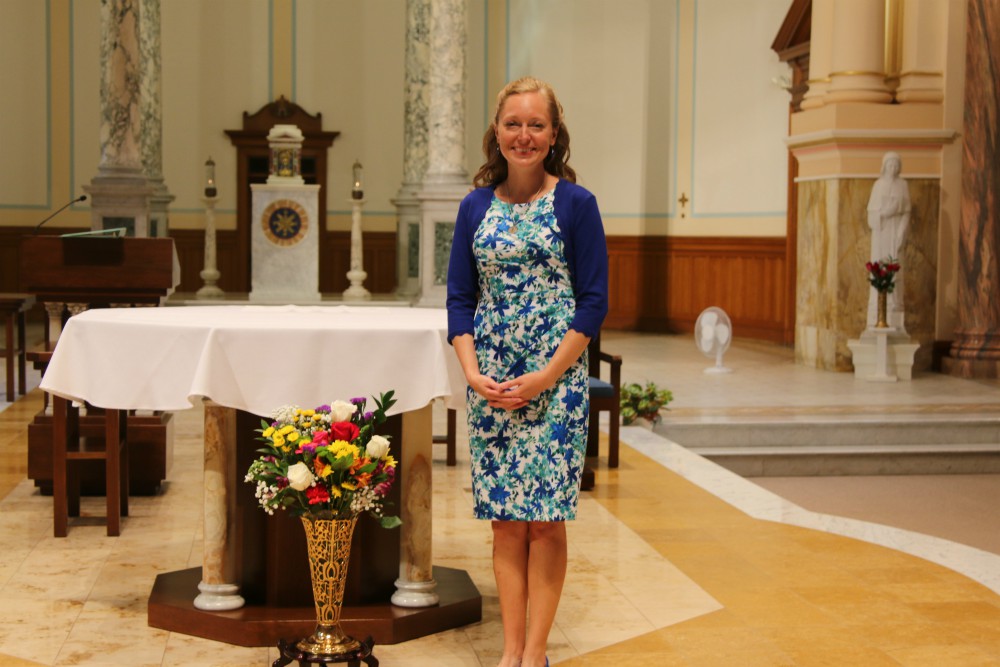
Sister of Charity of Cincinnati Tracy Kemme on July 25, the day she professed perpetual vows, in the Chapel of the Immaculate Conception at the Mount St. Joseph Motherhouse (Courtesy of the Sisters of Charity of Cincinnati)
This past Saturday, my local community of Marianist Sisters and I attended (via livestream) the perpetual vow ceremony of Tracy Kemme, a Sister of Charity of Cincinnati. One of my sisters connected her laptop to our TV and the four of us sat on couches and easy chairs to participate in her "forever yes," albeit from afar. We raised our hands to bless her as if we were there; we sang along with the songs from the liturgy; we clapped with joy after her profession, and some of us even shed a few tears during the Rite of Profession.
Participating in such momentous life commitments via livestream is commonplace in this time of COVID-19. One sister in my own community, for example, made her first profession this past June. Her profession ceremony was beautiful, but it certainly was not what she had imagined when she requested vows earlier this year. While only 13 people could be present in person, well over 250 people watched via livestream, which was graciously conducted by one of our more tech-savvy (and recently professed, as of this past May) young Marianist brothers.
While participating in such commitments virtually has become commonplace, the commitments themselves are not common. Indeed, they are miraculous, especially in these chaotic and uncertain times.
When the rest of us find ourselves overcome by fear, I'd like to suggest that we look at these recently professed men and women, particularly those who have made their final professions. They are the voices crying out to say that, despite the uncertainties that exist at the present — the worsening pandemic, the political and social upheavals in our nation, the deepening polarization in our church, the graying of our communities, the warming of our planet — God still calls. And their yes to God's call injects hope into a world full of despair.
Yes, amid pestilence and violence, racism and injustice, poverty and disease, God still calls. Our ancestors in faith testify to this, too. The history of our church and our religious congregations is filled with people who responded yes to God's call in the most terrible circumstances.
When I was a novice, I spent a lot of time reading about the history of my religious family (the Marianists), as many do during novitiate. Some of the stories I learned particularly inspired me and continue to do so, especially now.
One of the events I learned about was the expulsion of teaching religious orders in France in the early 20th century. When this took place, most of our French Marianist sisters went "underground." They pretended to be laypeople, simple schoolteachers boarding together in a house. But privately, they maintained their religious community life by praying together, living the vows, and making their annual retreats.
Advertisement
They were even able to have novices and religious professions! Ceremonies for the novitiate and profession of vows took place in a large classroom in a nearby school. The sisters would cover up the windows and stuff cloth in the keyholes and under doors so no prying eyes could see what was taking place inside.
In early 20th-century France, religious life was dangerous and had to be lived very differently. But God still called, and women still said yes.
Sometimes this response to God's call involved the literal sacrifice of one's life. In this instance, I think particularly of the four Marianist brothers who were martyred in Madrid in 1936 during the Spanish Civil War. When I read about these brothers during my novitiate, I was stunned to learn that three of these four brothers had professed perpetual vows less than two years before their martyrdom — two in 1934 and one in 1935.
Considering that the first widespread murder of priests, seminarians, and religious occurred in 1934, these three brothers knew their perpetual profession could lead to their deaths. They admitted as much in their letters requesting perpetual vows. Br. Florencio Arnáiz wrote before his profession in 1934, "The intention of serving Mary all the days of my life energizes me to overcome all difficulties."
Similarly, Br. Joaquin Ochoa wrote before his perpetual vows in 1935, "I do not want anything so much in this life as to be admitted to definitive profession ... to work for [Mary's] honor until the hour comes to die in her service."
One year and one week after Brother Joaquin's profession, he, Florencio, and two other brothers were murdered because they were religious.
God still called, and they answered yes with their lives.
All these witnesses to God's faithfulness from the past, along with the men and women who continue to say yes in our tumultuous present, fill me with hope. They are signs to me — and to all of us — that despite all the uncertainty, despite all the pain and suffering, God has not abandoned us. God is still working among us by calling people to love and to serve, even when the cost is great.
[Sr. Gabrielle Bibeau professed first vows in the Daughters of Mary Immaculate (Marianist Sisters) in May 2017. She is currently a research and program assistant at the North American Center for Marianist Studies in Dayton, Ohio.]





